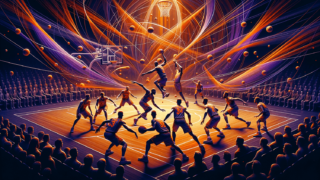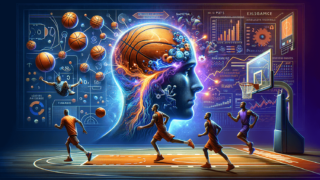
How Many Calories Should a Basketball Player Eat?
Written by: Basketball Universe
Last updated:

As the squeak of sneakers on the court fills the air and the sweet swish of a net follows the perfect shot, it’s easy to forget that behind every basketball player’s success lies an essential yet often overlooked aspect: their diet. Welcome to our blog post, “How Many Calories Should a Basketball Player Eat?” where we dive deep into the world of nutritional requirements for these athletes. Whether you’re a casual baller aiming to up your game or a competitive player striving for peak performance, it’s essential to know how many calories to consume to fuel your basketball dreams. Follow us as we dribble through the ins and outs of caloric intake, in a fun and professional way that’s as exciting as the last seconds of a neck-to-neck championship match. No buzzer-beaters here, just a slam dunk of deliciously nutritious information!
How Many Calories Should a Basketball Player Eat?
The number of calories a basketball player should eat depends on factors like age, gender, weight, body composition, and training intensity. On average, most high-performance basketball players need around 3,500 to 4,500 calories per day. However, it’s crucial to consult with a sports nutritionist or registered dietitian for personalized recommendations and to monitor the player’s performance and recovery.
Understanding Caloric Needs for Basketball Players
Before we jump into the specifics, let’s first discuss the importance of caloric intake for basketball players. Calories are the energy currency that powers physical activity and bodily functions. Consuming adequate calories ensures that a player can maintain and improve their athletic performance while preventing fatigue and injury. For an in-depth understanding, let’s take a closer look at the factors affecting a basketball player’s caloric needs and the key components of a well-balanced diet.
Factors Affecting Caloric Needs
Various elements come into play when determining the number of calories an individual basketball player needs, including:
- Age
- Gender
- Body weight and composition
- Activity level and training intensity
- Position on the team
- Metabolism and genetic factors
Because these factors can differ significantly between players, the specific caloric intake will vary. However, in general, most high-performance basketball players need around 3,500 to 4,500 calories per day, and we’ll use that as a reference in this blog post.
Macronutrient Breakdown for Basketball Players
To better comprehend the necessary caloric intake for basketball players, it’s essential also to understand the role of macronutrients in a sports diet. Macronutrients, which include carbohydrates, proteins, and fats, are the primary sources of energy for the body. Each macronutrient plays a unique role in an athlete’s performance, and the right balance is crucial for optimum results.
Carbohydrates: Fueling Basketball Performance
Carbohydrates are the body’s primary energy source during high-intensity activity. When it comes to basketball, they provide players with the power to sprint, jump, and make quick changes in direction. Players should aim to consume 3 to 5 grams of carbohydrates per kilogram of body weight per day, depending on the intensity and duration of their training.
Excellent sources of carbohydrates include:
- Whole grains (oats, brown rice, whole-wheat pasta)
- Starchy vegetables (sweet potatoes, corn, peas)
- Legumes and beans
- Fruits (bananas, oranges, berries)
Proteins: Building the Foundation for Muscles
Proteins play a crucial role in muscle growth, repair, and recovery. Since basketball requires endurance, speed, and strength, ensuring that players consume enough protein is key to on-court success. Players should aim for 1.2 to 1.7 grams of protein per kilogram of body weight per day.
Quality sources of protein include:
- Lean meats (chicken, turkey, lean beef)
- Seafood (salmon, tuna, shrimp)
- Dairy products (Greek yogurt, cottage cheese, low-fat milk)
- Plant-based options (tofu, tempeh, seitan, legumes)
Fats: Supporting Performance and Health
Fats act as a secondary energy source for the body, help with vitamin absorption, and are crucial for overall health. Basketball players should include healthy fats as part of their diet, aiming for 20 to 35% of their daily calorie intake to come from fats.
Good sources of healthy fats include:
- Avocado
- Nuts and seeds
- Olives and olive oil
- Fatty fish (salmon, mackerel, sardines)
Hydration: An Essential Component of Basketball Nutrition
An often-overlooked aspect of performance is hydration. On the basketball court, staying adequately hydrated helps to regulate body temperature, prevent muscle cramps, and promote optimal recovery. Players should regularly consume water throughout the day and practice session, aiming for at least half of their body weight in ounces of water daily.
During high-intensity games, consider consuming electrolyte-rich sports drinks or adding a pinch of salt to water to help replenish lost electrolytes through sweat.
Fueling for Training, Competitions, and Recovery
Basketball players need the right mix of nutrients to fuel their high-intensity workouts, maintain energy levels on game day, and support recovery. Below, we explore the specifics of tailoring nutrition for training days, competition, and recovery periods.
Training Days: Staying Energized on the Court
Basketball players should focus on consuming a well-rounded diet during training days that emphasizes:
- Frequent meals and snacks consisting of carbohydrates, proteins, and fats
- Consuming meals or snacks before and after training sessions to fuel exercise and recovery
- Maintaining consistent hydration
Game Day: Winning Nutrition Strategies
On game day, specific nutritional strategies help to maximize a player’s performance and energy. Here are some tips:
- Eat a high-carbohydrate meal about 3 to 4 hours before the game to ensure sufficient glycogen stores
- Consume a light snack, such as a banana or sports bar, 30 minutes to an hour before the game
- Always prioritize hydration, especially when playing in hot or humid environments
- During halftime, refuel with small carbohydrate-rich snacks such as fruit, pretzels, or energy gels
Recovery Period: Refueling and Rebuilding
Post-game and training recovery is just as vital as fueling before and during the game. Proper recovery nutrition allows the body to repair damaged muscle tissue, refill glycogen stores, and replenish lost nutrients. Follow these tips for optimal recovery:
- Consume a meal or snack rich in proteins and carbohydrates within 30 minutes to an hour after exercise
- Examples of recovery foods include a protein shake with fruit, a turkey sandwich on whole-grain bread, or Greek yogurt with granola
- Stay hydrated and include electrolytes if necessary
- Pay close attention to any muscle soreness and adjust training and nutrition as needed
Adjusting Your Caloric Intake for Basketball Success
Armed with this knowledge, basketball players can make informed decisions regarding their nutritional needs and create a personalized plan to optimize their performance. Remember, while the guidelines provided here offer a solid foundation, individual needs will vary. Always consult with a sports nutritionist or registered dietitian for personalized guidance and regular evaluations, and adjust as needed. Staying adaptable and focusing on continuous improvement, both on and off, the basketball court will ensure you are well on your way to becoming a top-performing athlete.
Supplements and Nutrient Timing for Basketball Performance
While focusing on whole-foods for nourishment should always be the priority, some basketball players may benefit from utilizing specific supplements or nutrient timing strategies to enhance performance and recovery. It is essential to understand that supplements alone cannot replace a well-balanced diet; however, they might serve a complimentary role when used appropriately.
Common Performance-Boosting Supplements
There are a few supplements with supporting scientific evidence that might help basketball players improve their performance:
- Creatine: Creatine supplementation may help increase muscular strength, power, and performance in high-intensity activities. This can be especially beneficial for basketball players looking to improve their explosiveness on the court.
- Beta-Alanine: Beta-Alanine is a non-essential amino acid that increases muscle carnosine levels, which may enhance buffering capacity and support decreased fatigue during high-intensity activity.
- Branched-Chain Amino Acids (BCAAs): BCAAs consist of leucine, isoleucine, and valine, which may help promote muscle recovery and reduce muscle breakdown during intense exercise.
Before considering any supplementation, consult with a sports nutrition expert or registered dietitian to ensure that it is a safe and suitable choice for your specific needs and goals.
Nutrient Timing: Maximizing Benefits and Performance
Nutrient timing is the concept of consuming nutrients (primarily carbohydrates, proteins, and fats) at specific times to optimize athletic performance, training adaptations, and recovery. While not an essential component of a basketball player’s nutritional plan, incorporating nutrient timing strategies can provide additional advantages:
- Pre-exercise: Consuming a combination of carbohydrates and protein before exercise can supply energy, preserve muscle glycogen, and minimize muscle protein breakdown.
- During exercise: Proper hydration and high-carbohydrate snacks or beverages may prevent fatigue, support electrolyte balance, and maintain blood glucose levels.
- Post-exercise: Consuming a balance of carbohydrates and protein after exercise can replenish muscle glycogen stores, promote muscle repair, and enhance recovery.
Monitoring Caloric Intake and Performance
Regularly assessing and adjusting caloric intake based on performance outcomes is crucial for any basketball player. Weight fluctuations, strength levels, and energy balance might indicate the need to alter the diet. Incorporating a monitoring system that includes regular body weight and body composition checks, coupled with measures of on-court performance, can provide valuable feedback to guide dietary modifications.
Recommended Tracking Methods:
- Body weight tracking: Checking body weight weekly will provide insights into caloric needs and nutritional adjustments. Significant weight loss might indicate a need for increased caloric intake, while weight gain may require a reduction in calories.
- Body composition assessments: Regular testing allows athletes to monitor changes in muscle mass and body fat percentages over time, signaling the need for dietary shifts.
- Performance evaluations: Continuously assessing on-court performance, stamina, strength, and recovery can illuminate the effectiveness of current nutritional strategies and indicate areas for improvement.
By remaining attentive to these variables and adapting their nutrition plan as needed, basketball players can get the most out of their training and competition while promoting overall health and well-being.
FAQ Section: Basketball Player Nutrition
Still have questions about a basketball player’s caloric intake? Here’s a compilation of frequently asked questions surrounding the nutrition requirements of basketball players, designed to provide even more insights and guidance.
1. How do I calculate my daily caloric intake as a basketball player?
To calculate your daily caloric intake, first determine your basal metabolic rate (BMR). Next, use the Harris-Benedict Equation or another online calculator to factor in your activity level. Finally, adjust the number based on your individual needs (muscle gain, maintenance, or fat loss) and monitor progress throughout the season.
2. How often should I eat throughout the day?
Eating 5 to 6 smaller meals and snacks, spaced evenly throughout the day, can help maintain consistent energy levels, distribute nutrient intake efficiently, and promote optimal performance and recovery.
3. Are there specific pre-game meal recommendations?
An ideal pre-game meal should be high in carbohydrates, moderate in protein, and low in fats and fiber. Some examples include pasta or rice with lean protein (chicken, turkey, or tofu), a sandwich with whole-grain bread and deli meat, or yogurt with granola and fruit.
4. What should I eat during halftime to maintain energy?
During halftime, aim for easily digestible, carbohydrate-rich snacks like fruit, pretzels, or even sports gels to refuel quickly and maintain energy levels throughout the game.
5. What is the best protein source for basketball players?
The best protein sources are complete proteins rich in essential amino acids, such as lean meat, poultry, fish, dairy products, or plant-based options like tofu, tempeh, and legumes. Opt for a variety of protein sources to support muscle repair and recovery.
6. What should I eat before practice?
Before practice, consume a light meal or snack that includes complex carbohydrates and moderate protein, such as whole-grain toast with almond butter and banana, oatmeal with a scoop of protein powder, or a turkey and cheese sandwich on whole-wheat bread.
7. How long should I wait to exercise after eating?
It’s generally best to wait 2 to 3 hours after a meal to exercise. However, the specific timing will depend on individual tolerance and the size of the meal. Finding what works best for you and provides optimum energy levels without causing discomfort during practice or games is essential.
8. Are there specific foods to avoid before a game or practice?
Avoid foods that are high in fat, fiber, or heavily processed, as they can cause gastrointestinal discomfort and hinder your performance. Examples include fried foods, beans, and sugary snacks.
9. How can I ensure proper hydration for basketball players?
For optimal hydration, aim to drink at least half of your body weight in ounces of water daily. Sip water throughout the day, and consume additional fluids before, during, and after practices and games to maintain consistent hydration levels.
10. How much protein per meal should I consume?
To optimize protein synthesis and nutrient absorption, aim for 20 to 30 grams of protein per meal or snack. An example of a protein-rich meal might include a 4-ounce grilled chicken breast, 1 cup of cooked quinoa, and a side of mixed vegetables.
11. Is protein supplementation necessary for basketball players?
Protein supplementation may be beneficial for some basketball players to fill gaps in their daily protein needs, but not always necessary. Focus on consuming whole-food protein sources, and consider using supplements like protein powders as a convenient addition if required.
12. Are there any recommended vitamins or minerals to support basketball performance?
A diet rich in whole, nutrient-dense foods should provide adequate vitamins and minerals to support basketball performance. Key nutrients include vitamin D, iron, calcium, and magnesium. If you have concerns about nutrient deficiencies, consult a healthcare professional or registered dietitian for personalized recommendations.
13. How do I monitor and adjust my nutrition plan for improved performance?
Continuously evaluate your body weight, body composition, and on-court performance to gauge the effectiveness of your nutrition plan. Collaborate with a sports nutritionist, coach, or registered dietitian to accommodate adjustments and fine-tune your dietary strategy for maximum success on the court.
Featured Posts
- No pillar pages found.




